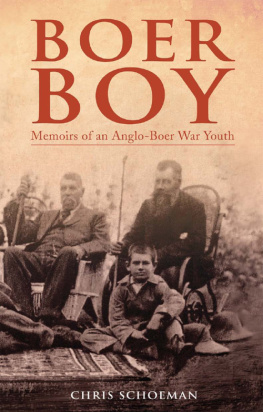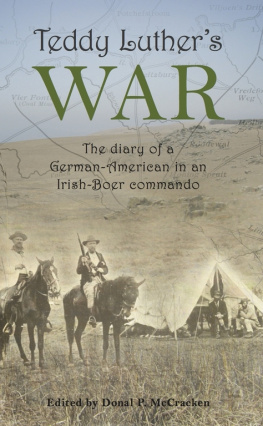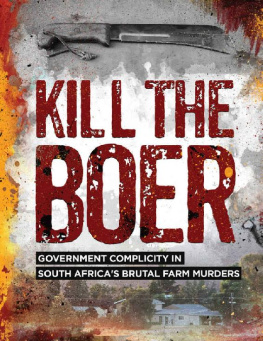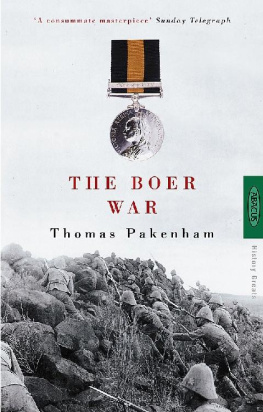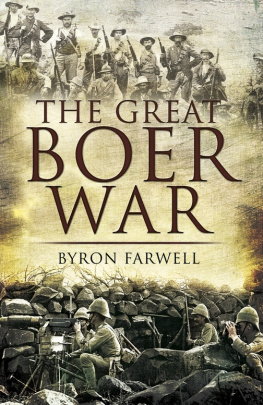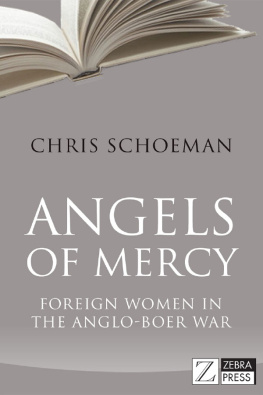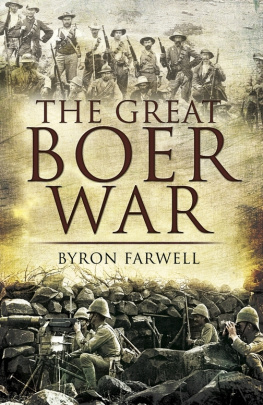
BROTHERS IN ARMS
BROTHERS IN ARMS
Hollanders in the Anglo-Boer War
Chris Schoeman

Published by Zebra Press
an imprint of Random House Struik (Pty) Ltd
Company Reg. No. 1966/003153/07
Wembley Square, First Floor, Solan Road, Gardens, Cape Town, 8001
PO Box 1144, Cape Town, 8000, South Africa
www.zebrapress.co.za
First published 2011
Publication Zebra Press 2011
Text Chris Schoeman 2011
All rights reserved. No part of this publication may be reproduced, stored in a retrieval system or transmitted, in any form or by any means, electronic, mechanical, photocopying, recording or otherwise, without the prior written permission of the copyright owners.
PUBLISHER: Marlene Fryer
MANAGING EDITOR: Robert Plummer
EDITOR: Bronwen Leak
PROOFREADER: Mark Ronan
TEXT DESIGNER: Monique Oberholzer
TYPESETTER: Monique van den Berg
INDEXER: Sanet le Roux
978 1 77022 340 0 (print)
978 1 77022 342 4 (ePub)
978 1 77022 343 1 (PDF)

Over 50 000 unique African images available to purchase
from our image bank at www.imagesofafrica.co.za
Dedicated to the people of the Netherlands for their great contribution to the development of South Africa.
CONTENTS
INTRODUCTION
In February 1881, the Boers regained their independence from the British Empire with a resounding victory at the Battle of Majuba Hill. It was a humiliating defeat for Britain and signalled the end of the First Anglo-Boer War of 18801881. Since then, the people of the Netherlands (more commonly known as Hollanders) had felt an increasing solidarity with their Dutch-speaking descendants in South Africa. Together they were a stamverwante volk (literally a nation of brothers and sisters). This sense of kinsmanship found expression in the formation of the Nederlandsche-Zuid-Afrikaansche Vereniging, which played a significant role in providing material and moral assistance to the Zuid-Afrikaansche Republiek (ZAR), also called the Transvaal, and the Republic of the Orange Free State during the Second Anglo-Boer War of 18991902.
When the war broke out, public opinion in the Netherlands was clearly on the side of the Boers. Queen Wilhelmina
One individual who actively championed the Boer cause in public was the great Boer sympathiser Hermanus Jacob Kiewiet de Jonge. Born in Groningen in the Netherlands, he obtained a doctorate from the University of Groningen in 1888, and ten years later helped found the Algemeen-Neder-lands Verbond (ANV). On 27 October 1899, he suggested to Dr Willem Johannes Leyds, the ZARs Special Envoy and Minister Plenipotentiary in Brussels, that an ANV press office be established at his house in Dordrecht, South Holland. During the war, it supplied the international press with information and influenced public opinion in favour of the Boers, publishing numerous pamphlets, one of which, Een eeuw van onrecht, became very well known.
In Flanders (Flemish Belgium), figures such as the Belgian writer Charles Polydore Pol de Mont, Frans Reinhard and the Flemish academic Hippoliet Meert held key positions in the Tweede Boerenbeweging in Antwerp, Brussels and Ghent respectively. A significant contribution from the Tweede Boerenbeweging was undoubtedly its organisation of aid for the Belgian Red Cross ambulance that went to South Africa to assist in the war effort.
The Flemish as a nation expressed their sympathy for the Boers in all kinds of ways through song, the naming of taverns and streets after prominent people and places in the Transvaal, and the establishment of more than seventy societies. A number of Flemish organisations founded in the aforementioned cities would later form the backbone of the Flemish Boerencomit, which also provided assistance to the Boers during the war.
Nicolaas Theelen, publisher and editor of the weekly newspaper Het Algemeen Belang der Provincie Limburg, actively drummed up support for the Boers in Belgian Limburg. In late 1901, he organised promotional visits by a certain Hendrik Louw and one of the Dutch volunteers who had been with the Boers in the field, Cornelis Plokhooij, who later recounted his experiences with the Boers in Met den Mauser: Persoonlijke Ervaringen in den Zuid-Afrikaanschen Oorlog.
Even Dutch communities within the United States sympathised with the Boer cause. Pro-Boer meetings were held in Grand Rapids and Chicago, and societies formed to collect funds for the Boers in South Africa. Following the example of a number of Irish volunteers from Chicago, a few Hollanders from Iowa left the United States to fight with the Boers in the field.
It was against this background that a large number of Hollanders and Dutch expatriates became involved in the war.
Of course, there were also some Hollanders on the wrong side, but they must have been few and far between. In April 1902, for instance, when General Jan Christiaan Smutss commando was in Springbok in the Northern Cape, Deneys Reitz sniped at the British fort. When they later investigated, they found the dead body of one Henry van Couverden, the son of a Dutch doctor. Van Couverden turned out to be a local volunteer for the British Army.
To trace the adventures and fates of the Hollanders in the Second Anglo-Boer War is not an easy task. Many of the volunteers just showed up in South Africa and later seemingly vanished into thin air. Some were registered as burghers of the Transvaal or Orange Free State, but after the fall of Bloemfontein and Pretoria to the British in 1900, the administration of the republics came to a relative standstill and many records disappeared. In contrast, the British kept regular records and at least the names of foreign volunteers who were British prisoners of war can be traced.
Fortunately, several of these Hollanders published their own diaries and memoirs, and although some appeared long after the war, when memories had already faded, they still remain invaluable in reconstructing the stories of the Dutch campaigners. These include the works of Cornelis Plokhooij, already mentioned; Henri Frederik Slegtkamp (Slegtkamp van Spioenkop: Oorlogsherinneringe van Kapt. Slegtkamp); Abraham Stafleu (Die Beleg van Mafeking: Dagboek van Abraham Stafleu); Leendert Corstiaan Ruijssenaers (Krijgsgevangenschap van L.C. Ruijssenaers, 18991902); Hendrik de Graaf (Boere op St Helena: Die Oorlogsdagboek van H. de Graaf ); Hendrik van Doornik (Die Buren in der Kapkolonie im Kriege mit England ); Andries Smorenburg (Lewensherinneringe); and Henri Sicco Oosterhagen (Oorlogsdagboekie van H.S. Oosterhagen).
One also finds references to these and other Hollanders in the personal memoirs of several Boers, such as Commandant Jacob Petrus Japie Neser (Die Oorlogsherinneringe van Kommandant Jacob Petrus Neser in the Christiaan de Wet-annale 7); General Christiaan Rudolf de Wet (Three Years War); General Pieter Hendrik Kritzinger (In die Skaduwee van die Dood ); Deneys Reitz (Commando: A Boer Journal of the Boer War); Jacob de Villiers (The Diaries and Recollections of Jacob Abraham Jeremias de Villiers in the Christiaan de Wet-annale 8); Dietlof van Warmelo (On Commando); and Roland William Schikkerling (
Next page

